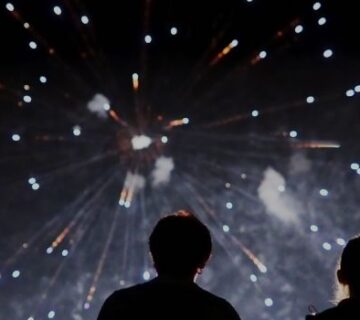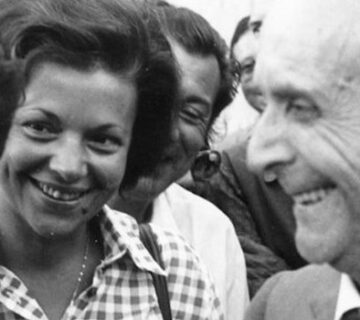Igino Giordani. Author, journalist, politician, ecumenist and expert in patristic studies, remains one of the most representative figures of the 1900s, a highly gifted individual who left a profound mark and opened prophetic perspectives on a cultural, political, ecclesial and social level.
Born in 1894 in Tivoli, the first of 6 children of Orsolina and Mariano, a bricklayer, Giordani was given the opportunity to study, thanks to the help of a sponsor. In 1915 he entered the army to fight in the First World War. An official in the trenches, he admitted later that he never wanted to shoot at the enemy. Nevertheless, he earned the Silver Medal for Bravery. He also received wounds, the pains of which remained with him for the rest of his life. He went on to get his degree in letters, he began teaching in Rome, and he married Mya Salvati. Theirs is a story of great yet delicate love, from which were born 4 children: Mario, Sergio, Brando and Bonizza.
Political commitment beginning in the 1920s
Giordani met Don Sturzo, who chose him to be the press officer for the newly-born People’s Party. Piero Gobetti published Giordani’s book entitled Rivolta Cattolica (The Catholic Revolt), defining it as “the synthesis of new Catholic thinking”. He founded the periodical Parte Guelfa, and between the years 1924 and 1925, he worked at spreading ideas on Unione delle Chiese (The Union of the Churches) and Stati Uniti d’Europa (The United States of Europe).
For political reasons, he left teaching in the public schools, and in 1927 he was employed at the Vatican Library, where he helped hire Alcide de Gasperi, who had just been released from the Fascist prison. He became the director of Fides, the periodical of the Pontifical Work for the Preservation of the Faith. He also collaborated with others at the review Il Frontispizio (The Frontispiece) by Piero Bargellini, and thus increased his contacts with the vigorous Florentine literary movement.
In 1944, he directed Il Quotidiano (The Daily), the new newspaper of the Catholic Action Movement; following that, he succeeded Gonella as director of Il Popolo (The Populace).
On June 2, 1946, he was elected to the government and became part of those “founding fathers” who laid down the ideal foundations of the Italian republic. He was re-elected in 1948, and in 1950 he became a member of the Council of Nations of Europe in Strasburg.
In brief, Giordani was a militant politician, not because of ambition but out of a spirit of love and service for the community. In the 1920s, he courageously struggled for freedom in the face of dictatorship. The marked ethical tendency of his political commitment brought him to be relegated to the margins of government under the regime: it was to be a period of intelligent, constant, “cultural resistance,” in which his writings raised high the values of freedom and of a new order.
The period from 1946 to 1953 remains his most vigorous and creative time. He worked audaciously and prophetically for peace among classes and among peoples, and he acquired a very original characteristic: his famous “candour” which led him to assume uncomfortable positions, such as that of the conscientious objector, a “no” to military expenditures, “no” to the demonizing of communists. A “candour” that quickly marginalized him (he was not re-elected in 1953), but which today helps us discover him to be (and these are the words of historian De Rosa) “an anti-political politician, he was not one who accepted just any political idea, nor was he ready to accept the reasons of power just for the sake of power.”
As a writer he published more than 100 works (an average of 2 every year), works translated into the main languages. He also authored countless reviews, commentaries, articles (over 4,000), letters and speeches.
An exemplary Christian
Out of a situation of suffering in the military hospital, Giordani at 22 years of age, sensed an initial call to holiness of life, a call reinforced by the writings of Catherine of Siena. He became a third order Dominican out of love for her, “the first who ignited the flame of the love of God in me.” As a Christian, he approached his work with an evangelical spirit, seeing in it his vocation. His most significant writings – ever contemporary – came forth from a deep knowledge of the history of Christianity and of the Fathers of the Church. Herein lies the solid spiritual and theological formation which characterized him. He put it to good use through his vigorous activity in fostering the Christian impact on culture, the spiritual formation of the laity and of priests and religious.
A forerunner in ecumenical dialogue Giordani, already in the 1930s, marked out elements for the Second Vatican Council. He studied, he translated, he explained the Fathers of early Christianity, at a time when they were almost forgotten. Their works formed the basis of his “Christian Social Message,” one of his better known works. He entered into them in such a way that Italo Alighiero Chiusano defined him as “a sort of ancient Father of the Church to whom God gave the privilege of rising and acting in our midst today.”
Along pathways of holiness
Yet the event that would most point Giordani’s life in the direction of luminous and demanding pathways of holiness came about in September 1948, when he met Chiara Lubich. This encounter marked for him the beginning of a new experience that was to envelop him completely; his spiritual membership was exceptional for his humility, transparency and unity. He would later say: “All of my studies, my ideals, the events of my life seemed directed towards this goal… Before, I had looked for it, now I had found it.”
Captivated by the evangelical radicality of the “spirituality of communion” that Lubich spoke of and lived out, Giordani saw in it the possible accomplishment of the dream of the Fathers of the Church: to open wide the doors of the monastery so that holiness of life would not be the privilege of just a few, but a mass movement among Christians. With all his mind and heart, he entered the Focolare Movement and came to be known as “Foco”, because of his burning love that bore witness and reached out to others. Furthermore, with his “yes”, he became a providential instrument by means of which the Focolare foundress would reach an ever deeper understanding of the charism she had received.
Giordani would them almost leave the cultural and political scene he had treaded till then, to assume a supernatural perspective. In making himself “small” before the total gift of love contained in the call to a life of virginity, to him – a married man – precisely in his unconditional love, a way of communion with them was opened up. He was pure of heart and his soul was open to all of humanity; therefore he could open the path to countless married persons all over the world called to this new consecration. They in turn became the backbone of vast movements to strengthen family life and for the evangelical renewal of all areas of human endeavor. Giordani thus became one of Chiara Lubich’s closest collaborators; indeed, she considers him a co-founder of the Focolare Movement.
Experiences of mysticism
At the crucible of the Focolare, Giordani went a step higher in the soul’s itinerary along the mystical way, where his spiritual trials, the misunderstandings and humiliation he went through due to his progressive social emargination, as well as his physical sufferings were relegated to the background in front of the daily experience of Christ present “where two or more” are united in his name, and before the mystery of a crucified and forsaken God. Giordani was gifted by Heaven with extraordinary experiences of union with God and with Mary, as well as “dark” trials of the soul reserved by Our Lord to whose he loves most. His life’s journey thus became a “flight” to God, which concluded on the evening of April 18, 1980. His mortal remains lie in the cemetery of Rocca di Papa (Rome).
How can we describe Giordani in one word?
Many people, including exacting intellectuals, call him “a prophet”.
For Chiara Lubich, he is “a man of the beatitudes,” and she reveals his extraordinary openness of soul when he calls him “a soul with the dimensions of humanity”.
For Tommaso Sorgi, who has attentively studied his life, he is someone “in love with God and with the human person.”
Nedo Pozzi
__________
The spiritual itinerary of Giordani, as revealed by his writings, especially those of a more autobiographical nature, is traced out in a brief biography entitled “Un’anima di fuoco” (A soul of fire) (Città Nuova publications), written by Tommaso Sorgi, director of Igino Giordani Study Center.


 Italiano
Italiano Español
Español Français
Français Português
Português


